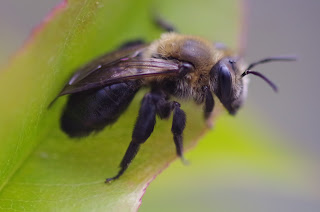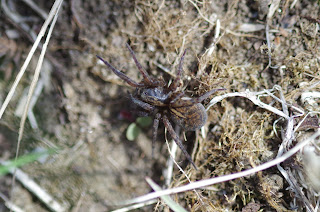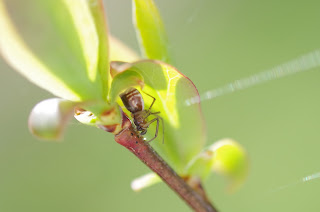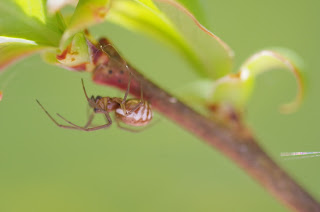Another one of my many philosophies of life is that you should try to learn something every day. Not that I am all that strict about it - I don't do this deliberately, and I don't question myself at the end of every day to find out what it is that I have learned, but my general point is that you should always continue to seek knowledge. I do read a lot, so I am probably learning something every day that way, but you can learn new things in a huge variety of different ways, by listening to what other people have to tell you, by making your own observations of the world around you, by experimenting, by asking questions, by looking things up to find the answers to your questions, by... well you get the idea. One of the ways I learn things is by doing crossword puzzles. Maybe that sounds weird, but most of the French words I know I have learned by doing crossword puzzles. Because the thing about crossword puzzles is, if there is a word you don't know, a clue you don't understand, you can still get that answer by filling all of the answers that cross it. So if you don't know the French word for summer at 7 Down, you can find out by knowing: 4 Across - types of dogs; 14 across - Missive; and 17 Across - Fungus*. It may not be the most efficient means of learning things, but you can learn a lot from crossword puzzles. In fact, the puzzle I have been working on before bed the last few nights taught me something (it doesn't really take me that long to do a puzzle usually, but when I do them before bed I tend to start nodding off. I don't know why I am telling you this, except that I don't want you to think I am too stupid to finish a puzzle in a timely manner. I have my pride. But at those times, the bigger challenge is not answering the clues, but keeping from poking my eye out with my pen as my head begins to droop). The clue for 60 Down was "insect stage after pupa." The answer was 5 letters long. I assumed it was adult, because after pupation the insect has reached maturity, and that is all I have ever seen fully developed insects referred to as in my reading. I wrote the answer in, even though I had my doubts, because it just seemed too easy - unless the challenge of it was to know what stage of life the pupa is. If you don't know that the pupa becomes an adult, I guess that would be hard. However, as I did the across clues, it became obvious that adult was not the answer. So, in order to find out what the insect stage after pupa was, I had to figure out 5 more clues that crossed it - which was a bit challenging because two of the five were punny theme clues. However, I did figure out those answers, and it turns out that the adult stage of an insect is called an imago. I looked it up this morning, and sure enough, the insect stage after pupa is imago. Or imaginal. This was amazing news to me. I mean, I have not done exhaustive research into insects, and you know that most days I am just too lazy to even look up what species the Backyard Bug of the Day is, but in all of the reading I have done I have NEVER come across the word imago. Every time that stage of insect life has been referenced I have seen it described as adult. It's in my bug books. I guess this is a technical term reserved for entomologists. But now... I know it. And so do you. We'll see if I remember it long enough to use it in a future blog when I am referring to adult insects. I mean imago insects.
But before we get on with the insects I found today, a little bird update:
Remember this little fella?
I got better pictures of it today, and have determined, based on a couple of features, that it is a blue winged warbler. It is disappointing to me that its wings are actually gray, or at least, they look that way to me, but that's the way it is. I sometimes wonder about the people who name things...
It flew around from branch to branch quite a bit.
Grabbing something to eat...
What have you got there? It doesn't look like a crab apple...
Let's zoom in to see... It looks like a caterpillar. In fact, it looks like the caterpillar that was Backyard Bug of the Day yesterday, which I found more or less under this tree. Not that I am saying that this is the exact same caterpillar, just that perhaps there are a lot of them in this tree (And by the way, if this is
not the same caterpillar I saw yesterday, then this is the third caterpillar I have seen this week). I looked up what blue winged warblers eat, and they eat insects and spiders, according to the website of the Cornell Ornithology Lab (which I believe to be a reliable source). It also said that they "forage in the upper half of trees and shrubs," and, "often hangs upside down," - both of which I saw it do.
This is exactly upside down, but close.
Anthropomorphizing, I would way it looks annoyed.
Here's that same shot, zoomed in to see that cranky face.

The blue winged warbler is not the only bird that enjoyed the offerings of the flowering crab apple tree. I saw several species, including this chickadee (the warbler pictures were taken with the telephoto lens. This one was taken on my bug walk, so it is from the macro lens). This leads me to wonder if this tree is full of caterpillars, or at least full of bugs in general that the birds are feeding on. I always thought that chickadees were seed eaters, but according to that Cornell Ornithology website, their diet is about half seeds in the winter, but in the other seasons they eat mostly insects and spiders. So that is probably what it was looking for in this tree, like the warbler. It makes sense. This tree is by far the most fully developed into foliage of all the trees in the backyard, in addition to being covered with flowers. Any bug that eats leaves, like caterpillars, or pollen or nectar, like many, many insects, would naturally be living in, or at least visiting, this tree right now. I cannot help but think of all the life in that tree that is hidden from my view because I am earthbound (it's not exactly an ideal climbing tree). Alas, I cannot fly...
Now, after all that, Backyard Bird of the Day:
Sparrow, on a wisteria vine, not the crab apple tree. I think the sparrows are building a nest in one of the bluebird boxes.
Have you forgotten by now that this is a blog about bugs? (Hey, I did mention bugs when I was talking about the birds!) Backyard Bug of the Day:
Cranefly
Female, ovipositing.
Random Bug:
One of those flies I've been seeing around. Or rather, a similar fly, because those had black wings, and this one has clear wings.
Now, how about an insect-spotting eye test?
Can you see the insect?
How about now?
How about now?
How about now? I actually only saw it at first because I was looking at the tree trunk and it landed right in front of me.
Meanwhile, elsewhere in the backyard...
Can you spot this one?
Looks like the same moth as the other one.
And those are all the bugs I have for you today. Other than a few ants and bees, I didn't see anything else. And speaking of not seeing things, the most intriguing things in the backyard the last two days have been things I have not seen. While walking along the paths, I have heard things moving under the leaf litter. Sometimes it sounds like snakes slithering, and I don't see the leaf litter move at all, but sometimes I have seen the litter moving, and it seems more like it is tiny mammals (mice, shrews or voles? Chipmunks?). There could be snakes AND tiny mammals, because if there are tiny mammals then it is a good place for snakes to hunt for food. However, I did not see whatever it was, or they were. It happened four or five times. So mysterious.
*I just made these up. They are not actual crossword
clues; they almost work as a block, but not really. Which is to say,
I don't have clues for a couple of the down words they make. But I am a
bug blogger, not a crossword puzzle writer. But here are the answers: 4
Across - Breeds; 14 Across - Letter; 17 Across - Mycete. The French
word for summer would therefore be
été, which I learned by doing
crosswords (although the accents aren't used in crosswording, so I
didn't know they were supposed to be there until I saw it written
somewhere). If you do crossword puzzles, that is a clue that comes up a
lot, so if you didn't know it before now, I have just taught you
something that will be useful if you decide to become a cruciverbalist.
Bowl and doily spiders were the spiders
du jour. Arachnid Appreciation:
.
.
.
.
.
.
.
.
.
.
.
.
























































